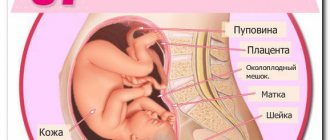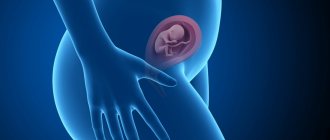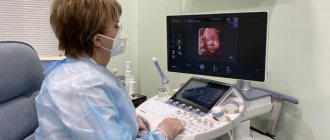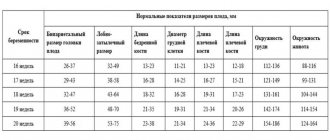At the 11th week of pregnancy, a woman experiences many different sensations, firstly, a constant feeling of fatigue, drowsiness, and lack of desire for physical activity. In addition, toxicosis begins to appear and soreness of the mammary glands begins to bother you. But there is no need to worry about changes in the body, these are natural symptoms of the 11th week of pregnancy. During this period, it is important to maintain optimal blood sugar levels; for this you need to eat often and in small portions. It is worth including complex carbohydrates in your diet: bread, cereals, pasta.
Doing a few simple physical exercises will help you feel better and give you more energy. It is recommended to do exercises in the morning and provide the body with proper rest. If you cannot cope with fatigue on your own, then you should consult a gynecologist. The doctor will help solve the problem medically.
Interesting Facts
| Options | Indications |
| Time from conception | 9 weeks |
| Period by month | 11 weeks |
| What month | 3 |
| Dimensions and weight of the fetus | 40-60 mm, 8-10 g |
| Uterus dimensions | In the pelvis, about 11 cm in diameter |
Your baby is the size of
Lime
40-60mm Size
8-10 g Weight
Your pregnancy is 11 weeks, the development of the fetus and the sensations during this period worry you most. And this is understandable. Your body is changing, responding differently to the new life inside and the associated hormonal changes. Anxiety will decrease if you better understand what is happening with mother and baby, what symptoms should alert you, and what you should not pay attention to.
Let's figure this out together, but first let's decide on the timing:
- 11 weeks of pregnancy is how many months? This is almost three months, the 1st trimester is ending.
- It has been 11 weeks since my last menstrual period. This is an obstetric method for calculating the gestation period. If you are counting from conception, then you are at 9 weeks.
Tenth week for baby
This week is important and significant; it is from here that the fetal stage of development begins, and the unborn child is now officially called a fetus, not an embryo. All the internal organs have already been laid down, which in the future will only have to grow and develop. Experts rightly consider the tenth week to be the final week in the first critical period: from this time on, the likelihood of developing defects that may arise as a result of chemical factors of various natures is no longer so high.
At this time, the fetus is freely located in the uterine cavity, without practically touching its walls. The unborn baby undergoes intensive formation of the nervous system, the transmission of impulses through the neuromuscular pathways is improved. This process leads to intense movements. Such movements are reflexive, they are active and caused by contact with the walls of the uterus. The fetus already makes fairly clear movements with its legs, head and arms. The woman is not yet able to feel the movements of the fetus, but during an ultrasound examination they are clearly visible.
At this time, the diaphragm is finally formed - a flat muscle designed to separate the abdominal and thoracic cavities. Further development of internal organs occurs.
Well-being of the expectant mother
We hope you have already felt a decrease in the signs of toxicosis. Starting from 10-12 weeks, there is usually less nausea and appetite improves. Many people note the return of their former performance and good mood.
The size of the uterus is several times larger than that of pre-pregnancy; it occupies almost the entire pelvic cavity. The belly is not yet noticeable, but you may find that your usual clothes are too tight and you want to wear something more spacious. Possible weight gain by the eleventh week is from 1 to 3 kg.
Changes in the breast
The mammary gland has become noticeably larger in volume. Under the influence of hormones, the nipple and areola darken. Some may notice an increase in the number of blood vessels in the décolleté area.
Pain
Moderate pain in the lower abdomen is associated with stretching of the ligaments that hold the uterus. The tailbone often hurts due to the hormone relaxin, under the influence of which the hip bones expand, gradually preparing for the upcoming birth. If there is a sharp pull in the lower abdomen, and the lower back hurts unbearably, you should seek medical help: perhaps we are talking about a strong tone of the uterus.
Discharge
Normally they should be colorless or slightly white, odorless. May be slimy. If the discharge contains pus, cheesy inclusions, light brown and dark shades, inform your gynecologist. Perhaps these are symptoms of candidiasis, sexually transmitted infections, or the threat of miscarriage.
Skin and hair condition
It's a lottery. For some, increased production of progesterone will improve their appearance: hair will become thicker, skin color will be healthier. For others, on the contrary, the skin will be drier or oilier, acne or enlarged pores will appear. The pregnancy period is characterized by pigmentation in the abdominal area, which will go away on its own after childbirth.
Possible problems
Pain
From time to time, a woman may experience discomfort associated with symptoms of pregnancy. If pain of a different nature occurs in a particular area, you need to know which of them are considered normal and which are regarded as pathology.
- Pain in the abdomen and lower back is usually associated with the tone of the uterus. This is par for the course when you are in your 11th week of pregnancy. Moderate abdominal pain should not cause concern, but if it intensifies or occurs too frequently, it is better to consult a doctor. Perhaps this is a threat of miscarriage, which requires immediate medical treatment.
- Leg pain causes cramps. These are frequent companions of pregnancy, which in severe cases can bother a woman throughout the entire period of pregnancy. One of the reasons is calcium deficiency in the body. Swelling of the legs can also cause discomfort.
- Pain in the anus is associated with the appearance of hemorrhoids. This disease is common in pregnant women due to frequent constipation and decreased physical activity.
Colds and fever
It is quite difficult to avoid colds during pregnancy. Sooner or later, this scourge overcomes the expectant mother and it is important to have an idea of how to deal with it. The most important rule is not to take medications without a doctor’s prescription. Only a doctor can assess the state of your health and determine the balance of benefits and harms of a particular medication.
- Traditionally, doctors recommend turning to traditional medicine for colds. Gargling and inhalation with herbal infusions will not harm the health of the pregnant woman and child.
- During illness, drinking plenty of fluids is recommended; healthy drinks include teas with honey, warm milk, and berry fruit drinks.
- If the temperature rises above 37.7 degrees, you should immediately call a doctor to exclude the possibility of spontaneous miscarriage. Before the doctor arrives, you can take paracetamol.
- If the thermometer shows 37-37.2 degrees, there is no need to worry. A slightly elevated body temperature during pregnancy does not entail serious consequences.
Discharge at the 11th obstetric week
Despite the fact that the critical period of pregnancy, which falls in the first trimester, is left behind, the expectant mother should exercise caution and also carefully monitor the nature of the discharge from the genital tract. At this stage, they are considered normal if they are uniform and light.
If you detect any other discharge (brown, yellowish, red, green), you need to contact a gynecologist.
In addition, itching in the perineum, pain in the lower abdomen, and the appearance of a strong odor from the vagina should cause alarm. These symptoms may indicate a threat of miscarriage or infection.
Bleeding
Unfortunately, bleeding during pregnancy is a fairly common occurrence that requires immediate medical attention.
The gynecologist, after examining the patient and additional examination using ultrasound, will be able to give a final conclusion about the cause of the appearance of blood from the vagina.
The occurrence of bleeding when the 11th obstetric week of pregnancy occurs can be caused by various factors:
- Pathology of the pregnant uterus.
If a woman has myomatous or fibromatous nodes on the uterus, and the embryo is implanted in close proximity to them, bleeding may occur. - Mechanical damage.
The cervix is sensitive and vulnerable during this period, which means any careless action (for example, during sexual intercourse) can lead to damage. - Lack of the hormone progesterone.
Causes thinning of the endometrium and detachment of the embryo from the uterine wall. - Frozen pregnancy.
If the fetus has stopped developing, then the woman’s body begins to reject the embryo, causing bleeding.
Twins
A multiple pregnancy follows almost the same scenario as a single pregnancy. But there are also some differences. For example, the burden that falls on the expectant mother. Naturally, during pregnancy with twins, it is much larger. To provide both fetuses with nutrients, vitamins and microelements, a woman needs to make a lot of effort. In addition, do not forget that with multiple births, labor rarely begins on time. As a rule, doctors and the pregnant woman herself are prepared for premature birth. By this time, the gynecologist must determine how they will pass: naturally or through a cesarean section.
Fetal development at 11 weeks
The size of the fetus is now about 4-6 cm in length. Approximate weight – 8-10 grams. The size of the head is more than half the length of the body, the arms are longer than the legs. At 11 weeks of pregnancy, the motor activity of the unborn child increases: he performs grasping movements with his fingers, pushes away from the walls of the uterus, and turns his head. So far the movements are invisible to the mother.
At this time, the color of the child’s eyes is determined and the irises are formed. The pulmonary vascular network of blood vessels, bronchi and trachea develops. The liver, in which hematopoiesis processes take place, grows. The gallbladder already produces bile, the kidneys produce urine. The heart contracts at a frequency of 120-160 beats per minute. It has four chambers and supplies blood to all internal organs. From an embryo, the baby turned into a full-fledged fetus.
Interpretation of ultrasound examination results
11-12 weeks are the fundamental obstetric period when the embryo turns into a fetus. It is important to check and see the basic parameters of the developing baby. Screening has a set of indicators, which includes:
- dimensions from the coccyx to the crown - KTR;
- frequency of contractions in the heart - heart rate;
- length of the nasal bone;
- thickness of the collar space;
- structure of the gall sac.
The doctor deciphers the screening. He compares the girl’s examination indicators with the parameters that exist in the standards prescribed in the table:
| Name of body | Normal index | Gestation period (weeks) |
| KTR |
|
|
| Heart rate |
|
|
| TVP |
|
|
| Yolk sac | Round shape, diameter – 4-6 mm | up to 12 weeks |
Tests and ultrasound
The period from 10 to 13 weeks of pregnancy is the optimal time for the first prenatal screening, the purpose of which is the timely detection of possible malformations.
It includes a biochemical blood test for hCG, PAPP-A protein, as well as an ultrasound, during which the size of the fetus is assessed, including the collar space and nasal bone, the position of its internal organs, the symmetry of the cerebral hemispheres, etc.
To assess risks, biochemical and ultrasound data are used together, as well as information about the patient: age, number of pregnancies, body weight, presence of chronic diseases. The woman receives a document containing laboratory test data and a quantitative indicator of the risk of certain deviations as a percentage.
How much amniotic fluid should there be?
The quality of amniotic fluid (amniotic, from the Greek amnion - fetal membrane) fluid is an important component of the successful development of the Baby. It contains many components: proteins, carbohydrates, sugar, fats and hormones that nourish the child until birth. What does “nourish” mean? Here are just a few facts:
- A certain amount of amniotic fluid is absorbed through the baby's skin before 24 weeks of pregnancy (later the skin becomes impermeable to amniotic fluid as it becomes keratinized).
- Already from 9 weeks, taste buds appear on the Baby’s tongue, and he begins to swallow amniotic fluid. In the last months of pregnancy, the fetus swallows about 20 ml of amniotic fluid in 1 hour.
Both in quantity and quality, amniotic fluid changes throughout pregnancy. So, if at 10 weeks the Baby needs 30 ml of amniotic fluid, which is similar in quality to plasma (the liquid part of the mother’s blood without cells), then by 18 weeks it already requires 400 ml, and two weeks before birth its volume is about 1500 ml . In addition to the components listed above, the amniotic fluid also contains exfoliating epithelial cells of the baby’s skin, vellus hair - lanugo, which covers the baby’s entire body until the last months before birth, secretions of his sebaceous glands, etc. The concentration of one or another component of amniotic fluid depends on the duration of pregnancy.
In order for the Baby to be comfortable in this “nutrient medium”, it must not only be saturated with useful substances, but also “renewed”, including because during the day in the last months before birth, the Baby secretes from 600 to 800 ml into the amniotic fluid urine. This means you should:
- drink at least 2-2.5 liters of liquid per day;
- It is better to completely exclude carbonated drinks from the diet - at least until the end of pregnancy and breastfeeding, since they are not beneficial for either the Baby or you;
- Doctors readily recommend drinking vitamin teas during pregnancy - the simplest and most effective way to extract useful and palatable substances from plants. Plant helpers contain many valuable substances necessary for a growing person;
- It is better to dilute fruit juices with water - this way they are better absorbed by the body, while reducing the load on the organs that secrete enzymes for digesting the juice, for example, on the pancreas.
What to discuss with your doctor
- What screening results will require additional genetic testing and genetic counseling?
- Find out when you should stop taking folic acid. It is believed that closer to the second trimester, a pregnant woman does not need to take it additionally.
- Get advice on what to do if your stomach suddenly hurts, bleeding appears, or your blood pressure drops. You should always have the phone numbers of your doctor and emergency services at hand.
What complications are possible?
It is quite difficult to avoid colds during pregnancy, when the protective functions of the immune system are naturally reduced. The most important thing is not to suffer from ARVI on your feet, stay at home, sleep and rest will be your best medicine.
If your throat hurts, use topical remedies: sprays, gargles and lozenges. For high temperatures, paracetamol will help. If your health does not improve within 3-5 days, be sure to consult a doctor.
Mild ARVI is not dangerous for the fetus at 11 weeks. You need to be more careful in situations with complicated forms of influenza and severe fever. To minimize risks, be sure to get vaccinated before cold season.
Consequences of poor results
Doing an ultrasound of the fetus in the first trimester means making sure that everything is fine with the baby or, on the contrary, you need to make an important decision in order to bear a healthy child in the future. The most common pathologies that can be detected by diagnostics:
- Down syndrome;
- trisonomy syndrome;
- cerebral hernia;
- aneurysms;
- developmental delays;
- anemia;
- heart disease;
- hypoxia;
- tachycardia.
The list does not end here, because tests can give all sorts of results, and specialists will evaluate the situation as they receive them. The above-mentioned diseases can only be diagnosed by a qualified doctor; there is no need to do this yourself.
Do's and Don'ts
The eleventh week of pregnancy is the best time to start exercising if you have not already done so. Moderate physical activity will only benefit you now. Choose yoga, swimming and aqua aerobics, walking and outdoor exercise, special fitness for expectant mothers. You train your muscles and cardiovascular system, which will definitely help you during childbirth.
Sex is possible at any stage of pregnancy, provided the woman is in good health and there are no contraindications voiced by the gynecologist. This may be cervical insufficiency or increased uterine tone with the threat of interruption.
Pregnancy management after IVF in the 1st trimester
The pregnancy management program after IVF in the 1st trimester may differ slightly from the usual one. Firstly, the woman continues to be observed at the IVF center by a fertility specialist until 6-7 weeks, when the doctor can record the heartbeat of the embryo. Only after this can the expectant mother contact an obstetrician-gynecologist. At the first stage, the doctor decides on the advisability of maintenance hormonal therapy
, prescribed earlier at the IVF center. Whenever possible, we try to either reduce or eliminate additional hormonal therapy.
Thus, monitoring of pregnancy after IVF begins at an earlier stage, and the program can be adjusted depending on the characteristics of the individual case: is it a singleton or multiple pregnancy, what problems should be taken into account, etc.

Checklist for 11 weeks of pregnancy
- Try to replace high-heeled shoes with flat-soled models. The load on the spine is growing every day; there is no need to additionally “torment” it with stiletto heels.
- Choose hypoallergenic cosmetics and care products in accordance with your skin type that changes during pregnancy.
- Sign up for your first pregnancy screening if you have not done so previously. You need to make it to 13 weeks and 6 days.
Get 1 pregnancy screening at the Women's Medical Center. We use the Delfia-LifeCycle system, which eliminates human errors and has an accuracy of 98%. The results will be ready within 1-2 days.
Indications for use
An ultrasound of the fetus in the first trimester provides for a thorough examination and diagnosis by a doctor who monitors the development of the child and the young mother. Before this period, the woman must register. Many people undergo ultrasound examinations, but pregnant women are in the vulnerable category. Doctors strongly advise screening in the 1st trimester to eliminate dangers to the life of the unborn baby. Main indications:
- the mother has given birth to children or a child with developmental disabilities;
- have a child with genetic diseases;
- age – 35-40 years;
- suffered from infectious diseases during gestation;
- have previously taken large amounts of alcohol or drugs;
- there were cases of frozen pregnancies;
- potential father is a close relative;
- took medications prohibited during pregnancy;
- there are hereditary diseases in close and distant relatives;
- spontaneous miscarriages.







